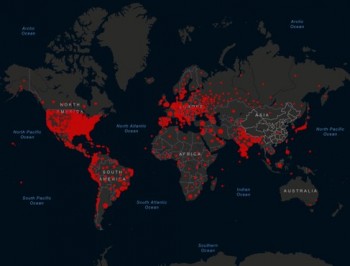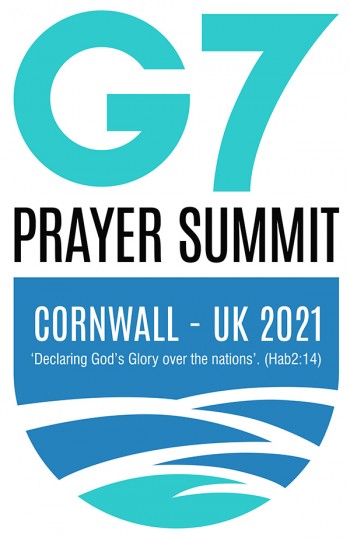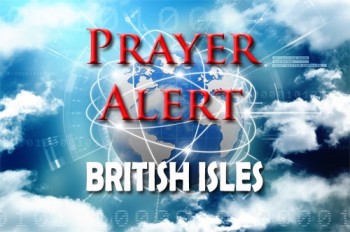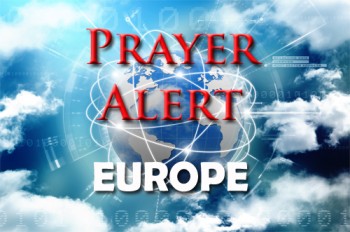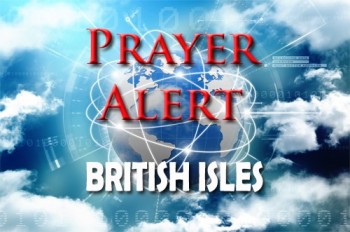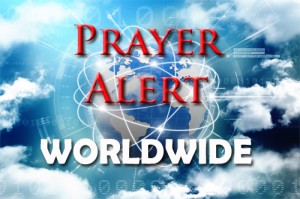Displaying items by tag: G7
Covid-19 Pandemic Prayer Update – June 2021
A mid – June prayer report looking at the opportunities and challenges of vaccinations, Covid-19 Hot Spots and some suggested Prayer Pointers with links to resources:
As of 13th June, the total global figure for people infected by Covid-19 stood at 175.7 million according to Johns Hopkins University. In addition to this, the recorded number who have died totalled 3,796,642. From a peak of worldwide daily cases in early January, numbers declined steadily until mid-February when they started to rise again, more recently exceeding the January peak.
Covid-19 hot spots
Here are those countries / regions which are currently showing high levels of infection.
The devastating wave of infections that overwhelmed India does appear to be slowing. India is the second worst-hit country in the world by the pandemic after the United States. The overall case count officially now stands at 29,439,989 cases, and 370,407 deaths although many fear it may be 5 or 6 times higher than this. The devastating second wave that engulfed India, one of the worst experienced by any nation, may finally have abated, but trauma and death has been left in its wake. There was barely a family in India left untouched by the virus, and with Covid hitting adults much worse than children, it has resulted in thousands becoming orphans in the past few weeks.
Brazil continues to see great suffering in 2021. Cases have increased since early February, peaking at the start of April at over 100,000 per day. The current daily average of 75,778 cases per day is slowly declining, but still exceeds that of the first wave in July 2020. Total cases have exceeded 17.3 million with 486.358 deaths. Having peaked at 4249 daily deaths on 8th April, the figure still remains high with over 2008 daily deaths still being reported. Whereas many countries have seen sharp declines following a peak, Brazil has been much slower at reducing cases and deaths over time.
South America continues to experience some of the highest levels of death due to COVID. Over the week 6th-13th June, Paraguay, Uruguay, Argentina and Colombia have all experienced some of the highest levels of death relative to population size, although thankfully cases are declining in all of these countries.
The US continues to be the country with the highest number of confirmed cases and deaths related to Covid-19 with figures at around 34,315,873 and 614,955 respectively. Thankfully the daily infection rate has fallen dramatically from a 7 day rolling average high point of nearly 250,000 cases in early January to just over 16,000 cases mid-June (John Hopkins) and daily deaths were reported as 308 on 13 June .
Cases in European countries are relatively stable, having declined over the last 6 weeks in most countries. There are signs of small rises in Russia and the UK amidst debates about the speed of easing restrictions and the possible impact of new variants.
New waves and Variants
New variants of COVID 19 continue to be the source of discussion and focus, not least as their interaction with the vaccination programmes and new waves of infection become a greater priority. The World Health Organisation have recently introduced a new naming convention for variants of Interest (VOI) and variants of concerns (VOC). "No country should be stigmatized for detecting and reporting variants," Maria Van Kerkhove, WHO's technical lead for Covid-19 response, wrote in a Twitter post. Rather, a WHO expert panel recommends using Greek alphabet letters to refer to variants, "which will be easier and more practical to discussed by non-scientific audiences," WHO says on a new webpage on its website.
The P.1 variant, first detected in Brazil and designated a variant of concern in January, has been labelled "Gamma." The B.1.617.2 variant, first found in India and recently reclassified from a variant of interest to variant of concern, is "Delta." Variants of interest have been given labels from "Epsilon" to "Kappa."
This New York Times article provides a useful and detailed analysis of the nature and scientific understanding of variants. Some countries, like the USA have been fortunate in avoiding the rapid spread of variants whereas others, such as the UK, have been affected more significantly. Thankfully, current variants do seem to be suppressed by effective vaccine rollouts, particularly when 2 doses have been administered. Dr Anthony Fauci urged everyone who has received the first dose of the Pfizer or Moderna vaccines to make sure to sign up for a second. "And for those who have still not been vaccinated yet, please get vaccinated.” He said vaccination is the best way to protect yourself and to stop this variant from spreading and becoming dominant in the U.S.
There has been much recent focus on the ‘Delta’ variant B.1.617 that was first detected in India in October. This is a concern because there is evidence that the risk of hospital admission is higher in people with the delta variant. Data also indicate that the variant is spreading rapidly through England’s schools. Public Health England has said the Delta (Indian) variant is 64% more transmissible than the Alpha (Kent) variant indoors and vaccines are less effective against it.
Vaccines
The vaccination programme remains the most likely vehicle for ending the pandemic. As of late April, more than 2.36 billion vaccine doses have been administered worldwide, with 12.2% of the world population having received at least one vaccine dose. Vaccines have now been administered in approximately 180 countries. Vaccines remain concentrated in high income countries - about 51% of people who have received at least one dose of a coronavirus vaccine were from high income countries, and at least 48% were from Europe and North America, yet these countries only represent 16% of the world’s population. Because of the limited availability of vaccines, most countries are prioritizing certain groups of people to receive their shots before others. People who are older or more likely to become very ill or die from COVID-19 are usually prioritized over those who are young and healthy. Some groups are prioritized because they are more likely to come into contact with an infected person based on what they do or where they live and, in turn, infect others.
Vaccine inequality remains a serious and potentially worsening problem. From Africa to Latin America, Asia and the Caribbean, the same issues have been replicated. On top of finding enough doses, there have been logistical difficulties with delivery, problems over healthcare infrastructure and, in some countries, public hesitancy towards vaccines.
Africa’s lack of vaccines – and the erratic supply of those that are eventually delivered – remains a major challenge. Only 28 million doses have been delivered on the continent so far – that’s less than 2% of the continent’s population – at a time when some wealthier countries have vaccinated well in excess of half their populations.
In terms of approved vaccines, the RAPS website provides a good overview of the current situation. There are currently 16 vaccines with some form of regulatory approval, of which 7 are being used widely across the world. 9 new vaccines are currently in Phase 3 trials, with a further 7651 in earlier stages of development. This is unprecedented and something we should all give thanks for, not least when considering the partnership work between scientists, public and private organisations, which is a source of great optimism.
Moderna and Pfizer have released data suggesting that their vaccines are well tolerated in adolescents and highly effective in preventing COVID-19. Canada, the US and the EU have already authorised the Pfizer vaccine in children as young as 12, and the UK has just approved the use of the Pfizer vaccine in children aged 12 to 15. However, there is a much debate as to the benefit of vaccinating children in rich countries, particularly when so many more vulnerable people in the world remain unvaccinated.
Political Leadership
The G7 summit of world leaders has just finished and placed COVID at the centre of its discussions. In particular they focused on worldwide vaccination supply, but also economic recovery from the pandemic. The group agreed to donate 1 billion doses to poorer nations, something welcomed by UNICEF who said “We welcome the commitment this week by leaders of G7 nations to accelerate the rollout of safe, effective, accessible and affordable vaccines for the poorest countries, with a goal toward ending the pandemic in 2022. Equitable access to COVID-19 vaccines represents the clearest pathway out of this pandemic for all of us — children included, and commitments announced by G7 members last week are an important step in this direction.” Others however have said that the group lacked ambition, highlighting that 12 billion vaccines would be needed worldwide, and a lack of clarity as to how the promised vaccines would be delivered.
Let’s Pray… Let us continue to declare that the novel coronavirus is defeated by the blood of Jesus.
We pray for divine intervention and for God's name to be glorified even as each nation and government tries its best to prevent or control the emergence of new waves of infection and finally arrest this epidemic.
We pray that individuals, leaders and nations focus on the needs of others rather than themselves, and that cooperation and compassion lie at the heart of the world’s response to the crisis.
We pray for our scientists. In particular we pray for those assessing and communicating risks associated with vaccines, that they be filled with wisdom and understanding. We pray too for those investigating, sequencing and analysing new variants.
We pray especially for the nation of India. We stand with our brothers and sisters who are living amidst this uncertainty. We pray comfort for those who suffer and their families, and resilience for those providing medical support in the most difficult of times.
We release wisdom, skill, and integrity upon our leaders, particularly as they grapple with the complexities, challenges and many voices that seek to influence them.
We pray that leaders and nations will see their moral duty to the world’s poorest and most vulnerable people and back this up with action not just words.
We pray for protection, wisdom and strength, for those working to bring treatment and comfort to the sick and their families.
We pray for individuals struggling to decide whether to receive the vaccine. We ask that their fears be settled and that the information they receive be truthful and honest.
We pray special grace and help for the vulnerable and lesser-developed nations.
We pray for a safe, effective, and affordable vaccine to be released soonest and the continued development of a range of vaccines to supply the whole world
We continue to release faith, hope, and love over the peoples of the world. May the Church seize this opportune time to manifest Jesus our Lord and Savior to those who are seeking answers and peace.
G7 Prayer Summit – Report Back
Feedback from the recent G7 Prayer Summit, written by IPC Senior Advisor - Brian Mills:
The G7 is a gathering of heads of State from some of the world's most wealthy nations. From 10th to 13th June, they met in the UK (the host country) in a most beautiful seaside location in the county of Cornwall in the far South-West of England.
Why was this important? Well, since the Coronavirus pandemic began eighteen months ago, it has been one of the first face-to-face gathering of any of the world leaders. Decisions taken there are likely to influence the planet in multiple ways for years to come.
At this summit, the prime areas for discussion were flagged as - a global response to the pandemic, the economy, climate change and security issues. Each of these had to some extent been looked at in detail in advance by the respective Governments' ministers responsible. So, at the summit corporate commitments were made, some of which have been announced, some probably will never be!
At previous similar summits over the past 25 years, there had been a gathering of praying people from the different nations somewhere in the vicinity of the summit. This year, because of the Covid restrictions in place within the UK, this was deemed not possible.
So why pray about political decisions? Firstly, Scripture informs us that "petitions, prayers, intercession and thanksgiving be made for all people – for kings and all those in authority, that we may live peaceful and quiet lives in all godliness and holiness. This is good and pleases God our Saviour, who wants all people to be saved and to come to a knowledge of the truth." In other words, the advance of God's kingdom is directly related to our praying for those in authority.
We are also aware that, whenever the kings of the earth come together, so do the principalities and powers arraigned against us and Christ. Some want Satan to rule this world. We don't. So it is imperative for us to pray, in order that Satan doesn't have His way, but rather that the kingdom of God is advanced throughout the world. Christ is king over all the earth.
 This year a Global G7 Prayer Summit came together in a way that was different from anything attempted before, and on a scale that was global. For each of the four days there was an online "virtual" season of prayer for 12 hours a day, led by prayer leaders mostly from within the UK, but with some significant help from elsewhere, and participation from many nations.
This year a Global G7 Prayer Summit came together in a way that was different from anything attempted before, and on a scale that was global. For each of the four days there was an online "virtual" season of prayer for 12 hours a day, led by prayer leaders mostly from within the UK, but with some significant help from elsewhere, and participation from many nations.
Many of those involved had little experience of praying about global issues, so for some it was a steep learning curve. A total of approximately 500 people participated in hour-long slots during the 48 hours of prayer – some multiple times – during the four days.
A few prayed through the night in their country. All of this was coordinated by the World Prayer Centre team in Birmingham, England, to whom a big "thank you" is due. Their expertise and previous experience in this kind of summit was pivotal.
But it all began in Cornwall. For the past five months a group of church and ministry leaders have been meeting weekly online to pray, at the invitation of the local MP who was responsible for hosting this prestigious gathering in his Parliamentary constituency.
 Throughout that time he has seen how prayer, in relation to the issues as they emerged, had been answered.
Throughout that time he has seen how prayer, in relation to the issues as they emerged, had been answered.
Consistently we had prayed for the presence of God, Father, Son and Spirit to be experienced.
That these world leaders would become aware of the God of creation, as they looked at the incredible beauty of His creation; or the needs of the poorer nations and peoples as they considered the way to combat poverty and the pandemic.
In addition, God had led several groups to walk and pray, do on-site prayer in various locations, and to join together to pray. Teams of young people engaged creatively. The churches in the area had mounted a witness, with crosses erected in the streets, with rubbish nailed to them! And on the Sunday beforehand, an online prayer evening brought together over 200 Christians in Cornwall from many expressions of church – hosted by the MP!
 Contact was made with a team of chaplains to the more than 5,000 police who had been drafted into the area to look after security issues. They testified that it was a mostly peaceful summit. None of the anticipated violence and trouble materialised. Instead the police were welcomed, blessed practically and spiritually and went home with glowing reports of their time in Cornwall. The word "open heaven" was mentioned a number of times – both in prayer and in the response of those on the streets.
Contact was made with a team of chaplains to the more than 5,000 police who had been drafted into the area to look after security issues. They testified that it was a mostly peaceful summit. None of the anticipated violence and trouble materialised. Instead the police were welcomed, blessed practically and spiritually and went home with glowing reports of their time in Cornwall. The word "open heaven" was mentioned a number of times – both in prayer and in the response of those on the streets.
The Prayer summit leadership had in advance set up connections with people on the ground who could provide information for prayer as and when necessary.
 The Prayer Summit itself was interspersed with worship, led prayer, declarations, Scripture, break-out rooms, simultaneous audible prayer.
The Prayer Summit itself was interspersed with worship, led prayer, declarations, Scripture, break-out rooms, simultaneous audible prayer.
We had consistently prayed "Your kingdom come...Your will be done....On earth, as it is in Heaven...." We had declared an "open heaven" over the area – and so it proved to be – naturally and spiritually. So we praise God for the answers.
This theme continued throughout the summit.
So what of the future? Well, there are many other gatherings of world leaders occurring regularly. Maybe God will lead you, wherever you are, to plan or be part of initiatives to pray throughout such summits - for the leaders and the decisions they make to be in accordance with God's agenda and purpose for this planet, and not man's.
More info on the G7 Prayer Summit, videos and Prayer Resources: www.g7prayersummit.org
G7’s climate change and vaccines decisions disappointing
Leaders arrived at the summit with a global pandemic crisis raging around them, but the hard truth is that they left Cornwall having failed to take the real action needed to end the pandemic. G7 leaders said their commitments are just the beginning- a foundation on which they can build but there was little detail on how. UNICEF said, ‘This G7 commitment is the beginning of the action required to end this pandemic. However, the urgent need immediately to share more vaccines with the world remains.’ Pray for the richest countries, with the power to do something, to deliver vaccinations globally and quickly. These nations pledged to spend $100bn a year to help poor nations deal with cutting emissions and global warming, but only two nations came up with firm promises to stump up the cash. Pray for every nation which made the pledges on climate change to honour them.
EU - UK sausage spat sizzles at summit
The UK has accused France of the ‘offensive’ remark that Northern Ireland is not part of the UK. Since 2016 the two sides have been trying to work out how to deal with post-Brexit trade and Northern Ireland’s land border with the EU. The latest spat is centered on sausages. When Boris Johnson met Emmanuel Macron at the G7 summit, he asked him to imagine if Toulouse sausages were barred from sale in Paris, which left Macron ‘astonished’. He told him Toulouse is part of the same territory, and inaccurately said, ‘Northern Ireland was not part of the United Kingdom’. Johnson furiously replied, ‘Northern Ireland and Britain are part of the same country.’ After the testy exchange Johnson told the media, ‘Some of our friends seem to misunderstand that the UK is a single country and a single territory. I think they need to get that into their heads.’
Tearfund criticises G7 for not fulfilling green pledges
The G7 leaders will meet in Cornwall from 11 to 13 June. Tearfund has said that since 2020 G7 has spent more on fossil fuels than on clean energy. As UK government funding kick-starts economies, there are unique opportunities to invest in decarbonising global energy systems and accelerating transition from fossil fuels. Although the UK announced green policies of petrol-car phase-out and ending overseas fossil fuels support, only 4% had ‘green strings’ attached. Tearfund feels that this reveals tensions between Government green ambitions and Treasury spending. Every day Tearfund witnesses worsening consequences of the climate crisis in communities around the world. Choices made now by G7 countries will either accelerate the transition towards a climate-safe future for all or jeopardise efforts to tackle the climate crisis. G7 nations represent only a tenth of world population but almost a quarter of CO² emissions. Their actions set the scene for success or failure of the Glasgow climate talks in November. Join with the World Prayer Centre in covering the G7 in prayer between 11th & 13th June - HERE.
Trade tariffs and G7 8-9 June
The G7 leaders will discuss many things, including trade tariffs. France says tariffs are illegal. Macron will not shy away from telling Trump what he thinks. Merkel may try to calm down her EU counterparts to avoid a full-scale trade war. Italy’s new prime minister is a political novice who said Italy is ‘second to no-one,’ and shares some of Trump’s views about ‘putting national needs ahead of global ones’. Japan is not expected to support Trump's tariff decisions. Some believe Theresa May could look for concessions to calm the waters ahead of Trump’s UK visit in mid-July. On 3 June US treasury secretary Steve Mnuchin faced sharp criticism from the angry finance ministers of all the G7 nations over America's imposition of steel and aluminium tariffs. See
